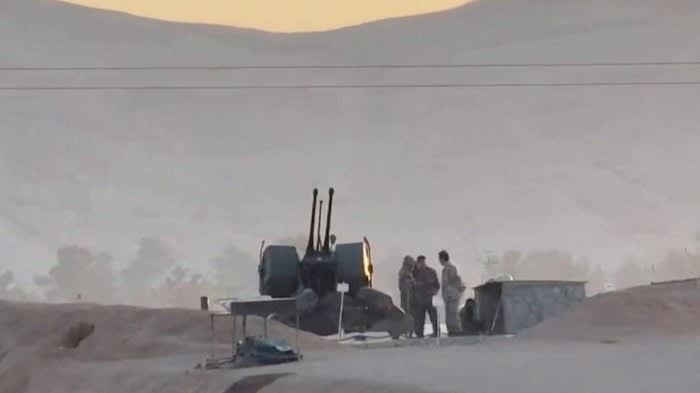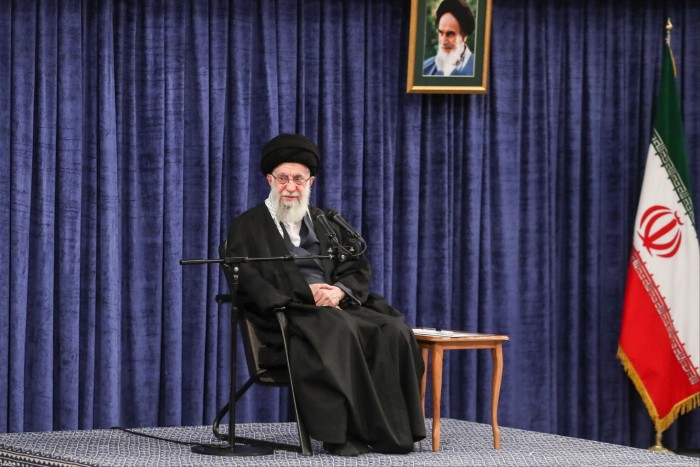Israel and Iran pull back from the brink

Gain access to Editor’s Digest without any cost whatsoever by unlocking it now.
Every week, Roula Khalaf, the FT's Editor, picks out the stories she enjoys the most and shares them in this newsletter.

Iran quickly downplayed Israel’s retaliation against the Islamic republic when explosions were heard near an air base near Isfahan early on Friday.
The Iranian commanders asserted that there was no harm and the blasts occurred because the air defense batteries destroyed unknown objects. There were no blame games against Israel or demands for retaliation.
During his live televised speech, President Ebrahim Raisi did not acknowledge the attack, despite previous claims by officials that they would respond promptly to any direct attack by Israel on Iranian land.
Israel was also relatively quiet in its response. When Iran recently attacked Israel from its own soil, it was always clear that Benjamin Netanyahu's administration would take action. The only unknown was when and how significant the retaliation would be.
However, the reaction that followed seemed to be constrained - at least for now. Israel refrained from acknowledging or rejecting the strike, opting not to claim responsibility as its citizens carried on with their regular routine.
At the present time, it seems that the long-standing enemies, who have been endangering the stability of the Middle East by intensifying their conflict, have refrained from advancing any further towards danger.
Despite his aggressive language, Netanyahu is typically cautious when it comes to taking risks. Instead of listening to his far-right allies who wanted a harsh retaliation, he listened to the advice of the US and other western allies of Israel. The response to Iran's attack was calculated and aimed only at specific targets. This approach reduces the likelihood of a major war breaking out in the region.
The attack that happened in Iran over the weekend was massive in terms of the number of things they launched, but everyone knew it was coming and the damage was minimal. Iran had been planning it in response to Israel's attack on their consulate in Damascus earlier in the month. They said they were successful in their mission and didn't want things to escalate any further.

Although the area has been anxious for several days, any relief they feel will be temporary.
After Hamas launched a violent attack on October 7, Israel responded with a strong offensive in Gaza. This has resulted in an increasingly risky situation in the Middle East where tensions continue to rise.
Fighting has broken out between Israel and militants supported by Iran, and it's happening in different places. American soldiers have become involved in battles in Iraq, Syria, and Yemen. Israel and Hizbollah, a group of militants from Lebanon supported by Iran, are fighting every day across their borders. If this were any other time, it would be seen as a full-scale war.
The pre-established boundaries separating Israel, Iran, and their supporters have become obsolete as the traditional practices are no longer followed.
When Iran directly attacked Israel, Ayatollah Ali Khamenei, who is the supreme leader, took a massive risk. He put aside his usual approach of being patient and strategic, even if it was only temporary, to make a point that he was willing to do anything, even if it meant putting the republic at risk through direct conflict. All this was to show that if Israel crossed any boundaries, he was willing to act.
Israel attacked Iran's diplomatic mission in Damascus, which caused Iran to become very angry. This made the Iranian leaders believe that Israel had gone too far and that they would not tolerate any more attacks. The attack was done by Netanyahu to show other countries that Israel means business and will not let anyone harm them. Israel suffered an intelligence failure on October 7, and they want to prove that they are still a powerful country.
The attack that occurred on Friday during the night had characteristics similar to Israel's usual method of targeting Iranian assets, which involves precise and controlled strikes as well as targeted killings. However, it is premature to conclude that the ongoing conflict between Israel and Iran has been resolved and is no longer a threat.
It's likely that Israel will keep attacking Iranian assets, especially in Syria where they've already eliminated at least 18 members of the Revolutionary Guards (including high-ranking officials) since October. During Friday's assault on Iran, Israeli planes supposedly targeted some of Syria's military facilities.
Despite their claims of wanting to avoid a complete war, there's still a high risk of the situation worsening due to an error in judgement or instigation. The unstable state is more dangerous because the regulations are continuously evolving, and the implications grow more significant. What one party perceives as a planned maneuver, the other may view as an intolerable provocation.
Both countries are equally committed to demonstrating that their deterrents are being rebuilt. They are also under pressure from their own citizens to react to the hostility of the other country.
Since Hamas carried out an attack that resulted in the death of 1,200 individuals, according to Israeli authorities, this has been the harsh reality. As the Israeli military campaign in Gaza persists, leading to an increasing death count of almost 34,000 people, as stated by Palestinian officials, the risks become more and more significant.
The possibility of a full-scale war has been prevented at the moment, but there is still a high risk for the Middle East and other areas.









































